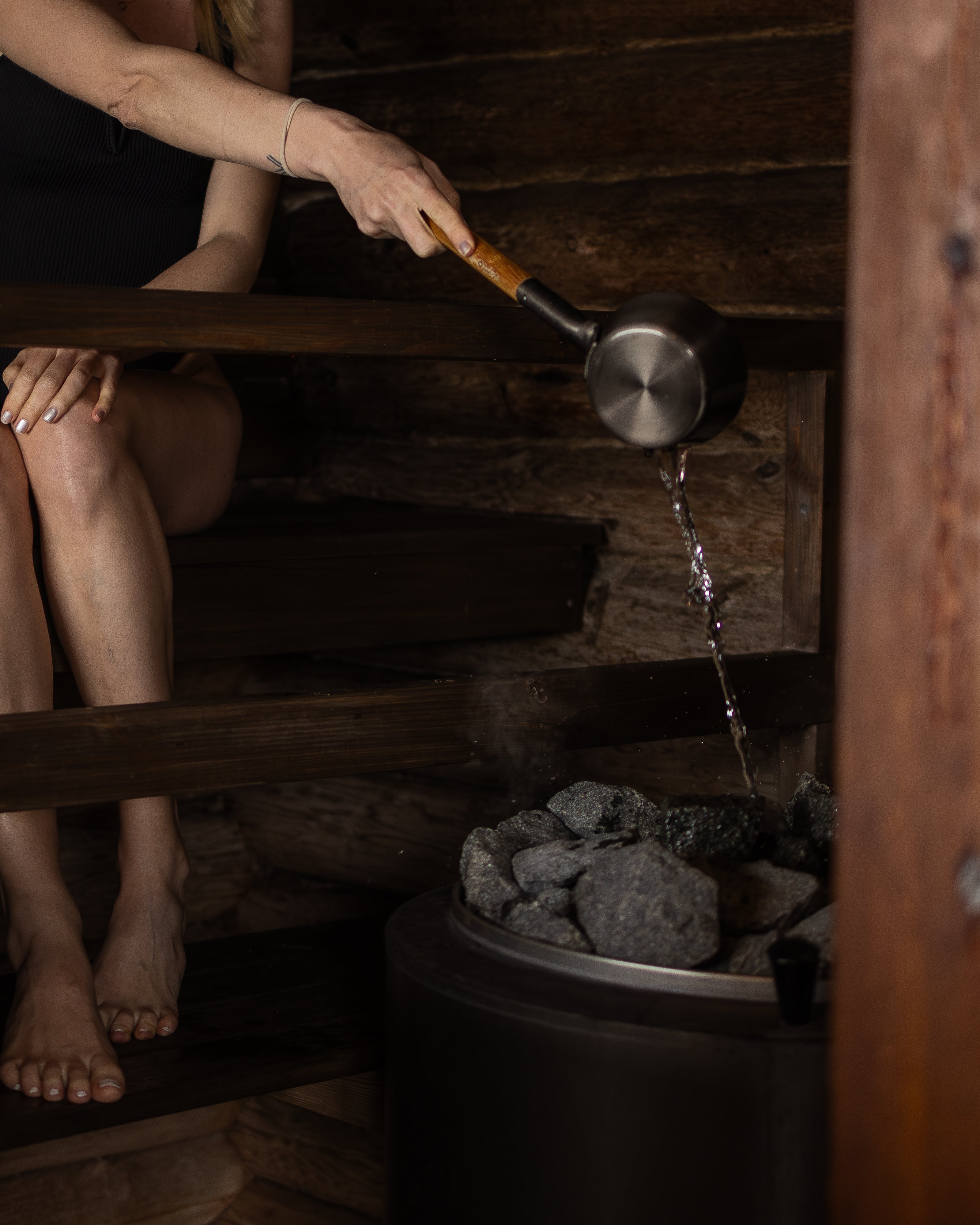A Finnish sauna is much more than just a space – it is a place for well-being, relaxation and togetherness. Whether it is your own home sauna, an outdoor sauna at a cottage or a rented sauna space, one of the most important decisions is choosing the right sauna heater. The sauna heater determines the atmosphere of the sauna, the quality of the steam and even the entire enjoyment of sauna bathing. In this blog post, we will go through what you should consider when choosing a sauna heater for your home or cottage, and finally we will also tell you how sauna scents can complement the experience. When choosing the right sauna heater, it is also worth consulting a professional from your local hardware store. After all, they sell them for their job.
Why is the heater the heart of the sauna?
A sauna heater is not just a source of heat – it creates the steam that makes up the entire sauna experience. Sauna bathing is at its best when the temperature and humidity are in balance, and the size, power and structure of the sauna heater have a decisive influence on this. A well-chosen sauna heater ensures that your sauna evening is relaxed and that the sauna experience does not become stuffy or too dry.
1. Sauna size and volume
The first thing to pay attention to is the size of the sauna room. The power of the heater should be in proportion to the volume of the sauna:
- Small sauna (2–6 m³) : a 3–6 kW electric heater or a light wood-burning heater is usually sufficient.
- Medium-sized sauna (6–12 m³) : a more powerful 6–9 kW electric heater or a larger wood-burning heater is needed.
- Large sauna or outdoor sauna (12–20 m³) : requires a 9–15 kW electric heater or a sturdy wood-burning heater.
Remember to also consider the sauna's insulation and the amount of glass surfaces. For example, glass doors and large windows increase the need for heating, as they also allow cooler air to easily enter the sauna from above and below.
2. Electric stove or wood stove?
Choosing between an electric or wood-burning stove is one of the biggest decisions.
- An electric heater is easy and quick, especially suitable for city homes and apartment building saunas. Its advantage is that it can be scheduled and provides even heat.
- A wood-burning stove brings the atmosphere of a traditional sauna and is often the choice for a cottage or outdoor sauna. It provides soft and natural steam, but requires a little more maintenance and heating time.
3. Number of stones and quality of saunas
The number of stones in a sauna directly affects the sensation of the sauna. The more stones, the softer and more humid the sauna. A small sauna heats up quickly, but its sauna can feel harsh. A large number of stones, on the other hand, stores heat and provides a longer, more pleasant sauna experience – perfect for long sauna sessions.
4. Intended use: home, cottage or sauna room
- Home sauna: practicality and ease of maintenance are emphasized. An electric heater is often the best solution.
- The cottage's outdoor sauna: a wood-burning stove creates an authentic atmosphere, combining the smell of smoke and the closeness of nature.
- Sauna space for rent: a large and efficient heater ensures that even a larger group can enjoy the sauna at the same time and for a long time.
5. Energy efficiency and safety
Nowadays, the emphasis in sauna heaters is also on energy efficiency and safety. A properly sized sauna heater saves electricity and wood, and has a longer service life. Also, make sure that the sauna heater is installed according to the manufacturer's instructions and fire safety regulations. Annual maintenance of the sauna heater also keeps its efficiency at the best possible level, and with a view to fire safety, it is important to keep the sauna heater clean.
6. Remember to maintain your heater
If you think with common sense that a heater heats up and experiences extreme stress at best several times a week, it is clear that the heater also needs maintenance. In electric heaters, it is important to change the stones at least every two years and ensure that the heating elements do not touch each other. The arrangement of the stones is also important in both electric and wood-burning heaters, because it allows air to circulate well and the steam to evaporate properly. In wood-burning heaters, the firebox becomes caked and for this reason, it should be inspected annually and the chimney swept frequently enough. By properly maintaining the heater, you ensure the best possible steam.
Sauna scents complete the experience
Once you have chosen the right heater, it is a good idea to finish off your sauna evening with atmospheric sauna scents . Menthol crystals, birch leaf scents and various herbal aromas make sauna bathing even more relaxing and refreshing. Sauna scents can also make breathing easier, freshen the air and bring back memories of a summer outdoor sauna in the middle of winter.
Sauna Menthol sauna scent is an excellent choice for your sauna routine because of its properties, but also because it leaves no residue in your sauna heater when used. Menthol is 100% pure mint oil, which vaporizes effectively in the sauna heater and also evaporates. Some sauna scents may contain synthetically produced aromas or oils that can leave residue in the sauna heater. So choose a sauna scent that is completely natural and pure.
Summary: Choosing the right sauna heater is one of the most important decisions when it comes to having the perfect sauna experience. Remember to consider the size of your sauna room, the heater's power, the number of stones, and the intended use. Once you have the foundation in place, finish off your sauna evening with your chosen scents that will make sauna bathing an unforgettable experience.


























